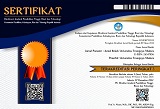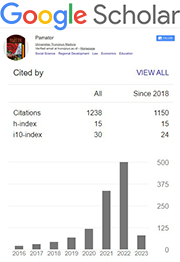Tradisi Tedhak Siten Terkandung Konsep Self Efficacy Masyarakat Jawa
Abstract
Keywords
Full Text:
PDF (Bahasa Indonesia)References
Andi, W.P. (2014). Tradisi Thedak Siten Jawa dalam Pengembangan Karakter. Jurnal FIB USU, 31-37.
Ardhani, P.K.D. (2016). Prosesi Upacara Tedhak Siten Anak Usia 7 bulan dalam tradisi Adat Jawa. Artikel Program Studi Pendidikan Pancasila dan Kewarganegaraan UNMUH Surakarta.
Devi, S.S.N. (2019). Upacara Tedhak Siten Di Desa Banyuanyar Kecamatan Banjarsari Kota Surakarta. Artikel Institut Seni Indonesia.
Ersanli, C.Y. (2015). The relationship between students academic self-efficacy and language learning motivation: A study of 8th graders. Journal Social and Behavioral Sciences, 199, 472-478.
Lavasani, M.G., Mirhosseini, F.S., Hejazi, E., & Davoodi, M. (2011). The effect of self-regulation learning strategies training on the academic motivation and self-efficacy. Journal Social and Behavioral Sciences, 29, 627-632.
Nuryah. Tedhak Siten: Akulturasi Budaya Islam Jawa (Studi Kasus di Desa Kedawung, Kecamatan Pejagon, Kabupaten Kebumen). Jurnal Institut Agama Islam Negeri Jurai Siwo Metro Lampung.
Panadero, E., Jonsson, A., & Botella, J. (2017). Effects of self-regulated learning and self-efficacy: Four meta-analyses. Journal Educational Research Review, 22, 74-98.
Probowardhani, K.D. (2016). Prosesi Upacara Tedhak Siten Anak Usia 7 Bulan Dalam Tradisi Adat Jawa. Artikel UNMUH Surakarta.
Roshandel, J., Ghonsooly, B., & Ghanizadeh, A. (2018). Motivational self-system and self-efficacy: A quantitative survey-based study. International Journal of Intruction, 11(1), 329-344.
Sugiati, R. (2019). Simbolisme Pada Tradisi Tedhak Siten (Ritual Turun Tanah) Di Desa Bandar Lor Kota Kediri. Artikel Universitas Nusantara PGRI Kediri.
DOI: https://doi.org/10.21107/pamator.v14i1.9559
Refbacks
- There are currently no refbacks.
Copyright (c) 2021 Ana Musdalifah

This work is licensed under a Creative Commons Attribution-ShareAlike 4.0 International License.
Jurnal Pamator : Jurnal Ilmiah Universitas Trunojoyo by Universitas Trunojoyo Madura is licensed under a Creative Commons Attribution-ShareAlike 4.0 International License.















.png)